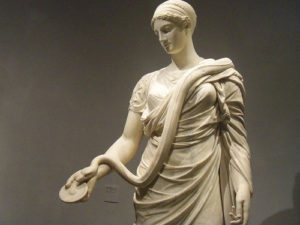[Greek] ὑγιής (hygiēs), [Latin] sanitas, [Latin] ambulare, [Latin] restituere, [Latin] sanare: healthy, whole, sound, well, restored, sound (in doctrine); Mt.12:13, Mt.15:31, Mk.5:34, Jn. 5:6, Jn. 7:23, Tit. 2:8
Background Information:
Greek Hellenism: Hygieia was the goddess/personification of health, cleanliness, and hygiene. She was associated with the prevention and the continuation of good health. Statues appear with this goddess holding a serpent and bowl. The serpent represents the art of healing. The bowl represents the pharmacological sciences. Health comes with a sense of balance between the body and soul. Bodily and spiritual health belong together, so that a person cannot have the one with the other. Virtue follows the health of the soul and vice follows sickness. All excess damages health.
Old Testament: Health and the healer (physician) were definitely highly valued. Health is better than riches. Healing is from the Most High as the physician works through means of healing given by God. Sin and sickness are still interconnected, but healing comes forth from atoning sacrifice and the work of the physician.
New Testament: This spiritual and physical balance was not given much priority in the Palestinian world. Instead, Jesus was seen as the victor over sin and suffering by His deeds. At His Word health is restored visibly. John’s epistles continue the Hellenistic formula for health. The pastoral letters apply “soundness” to true and correct doctrine (teaching).
Scripture:
“Then He said to the man, ‘Stretch out your hand.’ He stretched it out, and it was restored as sound as the other.” Mt.12:13
Jesus, though His healing power, restores the man’s hand.
“Beloved, I hope you are prospering in every respect and are in good health, just as your soul is prospering.” 3 Jn. 2
This letter addresses the problems of the early Church. This passage borrows from the Greek Hellenistic values focusing on both physical and spiritual health. A sound physical and spiritual balance is necessary for good health.
“And sound speech that cannot be criticized, so that the opponent will be put to shame without saying anything bad to say about us.” Tit. 2:8
This scripture passage pertains to Christian proclamation and teaching (doctrine). Sound (accurate) words cannot be criticized. These are truthful words.
Conclusion:
Hygiene, hygienic, sanity, sane, ambulance, restitution
It was interesting to learn that Greek Hellenistic culture advocated a balance with physical and spiritual health. Historically, hygiene was viewed in a more general sense. Today, hygiene is more specifically defined in maintaining health in various medical disciplines, such as dentistry. As with a sound body, sound teaching provides for a healthy and strong faith and understanding.
